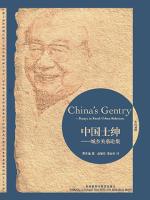China's Gentry
Hsiao-tung Fei, one of the greatest experts in Sociology and Anthropology , is viewed as the founders in this two areas in China. From one of his famous books From the Soil —The Foundations of Chinese Society, we can know that he has real passion in focusing on China’s villages. He feels the duty to study for China’s society structure and he has the ability to foresee the changes that might happen between cities and countries. In book China‘s Gentry , 7 different chapters introduce 7 different topics, including imperial power, technical knowledge, agriculture, social erosion ,and so on. Evidence, comparison and analysis make this book professional and more easier for readers to understand.
Through many perspectives, the book lead the readers go deep into the world of China’s gentry . Actually, before reading this book, I really don’t know much about China ‘s gentry, but now I am glad that I could share my opinions about this book.
As is known to us all, gentry in China makes a huge influence on China’s society. One prominent feature of the relationship between gentry and peasantry is the coexistence of conflict and cooperation. For example, if the emperor brutalizes his people, scholar-official has the function in mediating the imperial power. Just like the author says,“the more fearful the ruler and the more tiger-like, the more valuable is the gentry’s protective covering”. “Thus the opposition between gentry and peasantry in traditional China was held within bounds by the real economic interdependence of the two classes, by the co-operation between the two in dealing with the imperial power, and by common ethical principles”, the author concludes. I agree with his point of view a lot. So it is not hard to understand the reason why retirement and even a hermit’s life can be ideal for some ancient Chinese people.
Social erosion, written in chapter 7, is a new definition to me. “Men, it is suggested, are like plants that take their nourishment from the land. But when the springtime of their growth is past and they come to the fall of life, they must return to the land, just as leaves of a plant fall and come in time to nourish its roots.” So we can see that a symbolic kinship between man and the earth is rooted in China’s traditions. But now, with the development of the society, young people tend not to coming back to their villages for they can not find their own values when they are “trapped” in small places. They have dreams and they think they could realize their future in big cities. The author see this phenomenon a bit pessimistically. But I think it is quite understandable and I think this will promote the process of urban-rural integration.
Do we need gentry now? The answer for me is No. We do need people who are like to gentry for they can lead the people in villages be more educated and make more children there realize the importance of the knowledge. But they are not real gentry anymore. The real gentry have the power to step in social policy, and they can protect villagers by devoting themselves to make their lord happy. This means that they take on political functions. So if gentry reappears, the control of the central government in the villages may be weakened. That is not good for the society now.
Thanks
for reading!



 京公网安备 11010802032529号
京公网安备 11010802032529号